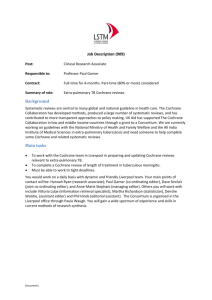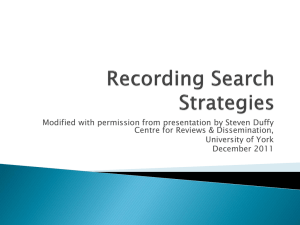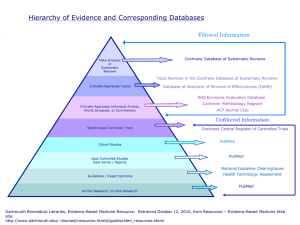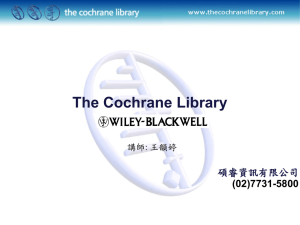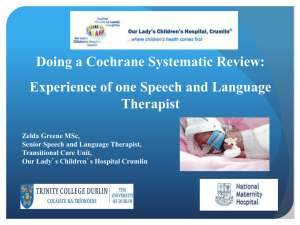Click here for the minutes from this meeting
advertisement
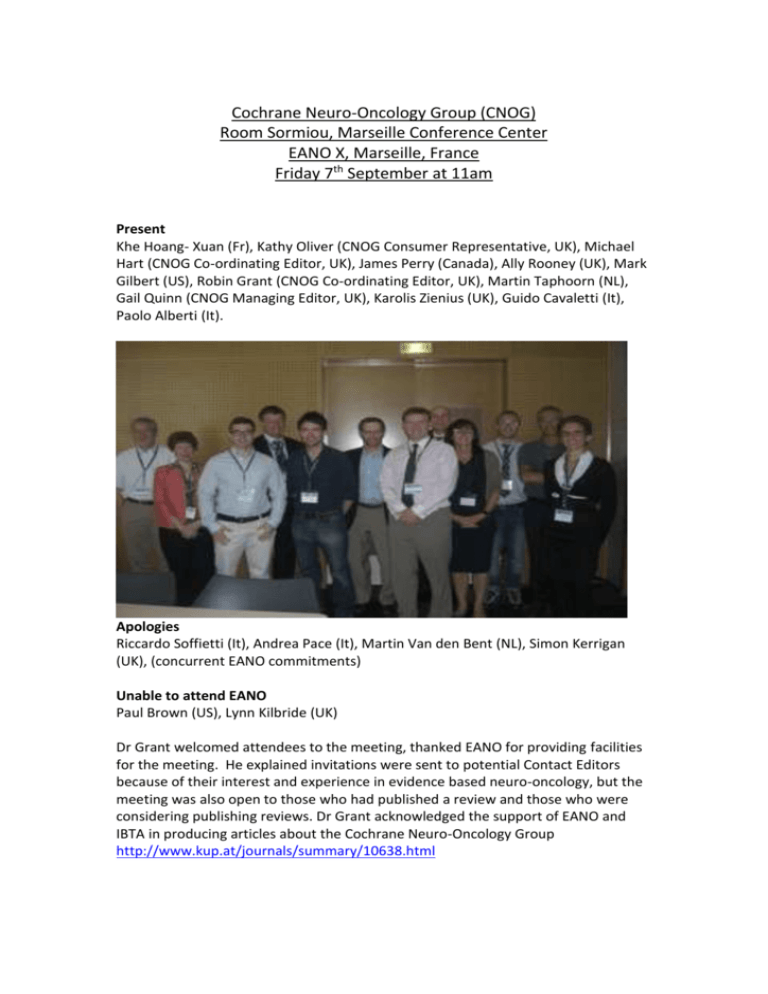
Cochrane Neuro-Oncology Group (CNOG) Room Sormiou, Marseille Conference Center EANO X, Marseille, France Friday 7th September at 11am Present Khe Hoang- Xuan (Fr), Kathy Oliver (CNOG Consumer Representative, UK), Michael Hart (CNOG Co-ordinating Editor, UK), James Perry (Canada), Ally Rooney (UK), Mark Gilbert (US), Robin Grant (CNOG Co-ordinating Editor, UK), Martin Taphoorn (NL), Gail Quinn (CNOG Managing Editor, UK), Karolis Zienius (UK), Guido Cavaletti (It), Paolo Alberti (It). Apologies Riccardo Soffietti (It), Andrea Pace (It), Martin Van den Bent (NL), Simon Kerrigan (UK), (concurrent EANO commitments) Unable to attend EANO Paul Brown (US), Lynn Kilbride (UK) Dr Grant welcomed attendees to the meeting, thanked EANO for providing facilities for the meeting. He explained invitations were sent to potential Contact Editors because of their interest and experience in evidence based neuro-oncology, but the meeting was also open to those who had published a review and those who were considering publishing reviews. Dr Grant acknowledged the support of EANO and IBTA in producing articles about the Cochrane Neuro-Oncology Group http://www.kup.at/journals/summary/10638.html The reason for the first meeting was to more fully explain the Cochrane Collaboration, the process of completing a review and what support was available for authors. The meeting would also cover the role of Contact Editors for sections of the Cochrane Neuro-Oncology Group. Finally, the aim was to identify areas where there was a need for a review and explore ways of encouraging reviews in areas where trials existed, but no systematic reviews were published. We are also keen to encourage young motivated authors into evidence based medicine, supported by experts in the field. Gail Quinn, Managing Editor of Gynaecological Cancer Review Group which also publishes reviews in neuro-oncology outlined the role of Cochrane in performing high quality systematic reviews of randomized controlled trials on a broad range of health topics. She explained that Cochrane uses transparent, replicable, accountable methodology for appraising and summarising of relevant research, identifying gaps in knowledge and setting priorities for new research. The reviews are for clinicians, health care providers, consumers, researchers and policy makers. She outlined the Editorial process for a Cochrane Protocol and when contact editors need to input their comments and suggestions. Ms Quinn explained the various Cochrane training packages available online, workshops, webinars and other resources. Cochrane has a central server for managing documents, contacts details and workflows (Archie Content Management System) and software packages used for writing reviews (RevMan). RevMan allows authors to prepare text, build the tables showing the characteristics of studies and the comparisons in the review and to add study data. It performs meta-analyses and presents the results graphically and enables contributors to the Cochrane Collaboration to meet the demands of producing high quality systematic reviews for publication in The Cochrane Library and elsewhere. Dr Michael Hart, Co-ordinating Editor of the Cochrane Neuro-Oncology Group, presented information on the 30 completed reviews, of relevance to the neurooncology community now found on the Neuro-Oncology Cochrane website previously spread across many Cochrane Review Groups,(e.g. Palliative Care (PaPaS), Epilepsy, Lung, Childhood, Back CRGs), in addition to the Gynaecology Cochrane Review Group which supports smaller cancer sites (e.g. Neuro-Oncology). He showed the geographical representation of current authors across the world and explained that there are Cochrane Centers in many countries that may assist in support and training. Dr Hart demonstrated aspects of a review including statistical input, risk of bias, forest and funnel plots. Dr Grant then completed the presentations, explaining that the Group were looking for contact editors, with experience in specific areas; e.g. glioma, metastasis, primary CNS lymphoma, spinal cord, neuropathy, quality of life and palliative care and that he hoped those approached, having heard more about Cochrane and the level of commitment required, would accept the roles of contact editors. He also explained the vision of linking Cochrane neuro-oncology evidence based training with major societies such as EANO, SNO, ASNO, AAN Neuro-Oncology Section and patient charity groups (IBTA). He would ask the contact editors to consider areas in their expertise where they felt a Cochrane Review was desirable and consider who could be approached. Once suggestions were received he would organise a prioritisation meeting to decide which reviews should be selected for submission for a Programme Grant Application to enable these to be done. The Cochrane publication policy allows for reviews to be simultaneously published in international scientific print journals, by agreement. (http://www.cochrane.org/policy-manual/225-publication-versions-cochranereviews-print-journals) Dr Grant informed the group that a collaborative submission from three international centres, led by Karin Gehring (NL) will produce a review entitled “ Interventions for cognitive deficits in adults with radiation-induced cognitive impairment”. This was selected, by the Cochrane Neuro-Onc Group/ Gyn Cancer CRG, as one of two proposals submitted to NIHR for consideration for a Cochrane Incentive Grant. Prof Gilbert felt that this link between evidence based training in Neuro-Oncology assisted by the Cochrane Collaboration fitted well with the educational role of SNO. Although, not part of that committee, he felt that an approach from the Cochrane group to explore collaboration would be important. Prof Perry suggested identifying topics and putting a call out for potential interest. Kathy Oliver said that this would be of great interest to patients and IBTA had worldwide links to groups and consumers which could be used for calls for interest. Dr. Grant considered that there may be a possibility to apply for incentive grants in areas where patient organizations wanted best evidence for treatment e.g. British Acoustic Neuroma Association (BANA) and Pituitary Association (Pit-Pat). Patient involvement and review dissemination could be assisted by the charity and published on the Cochrane Library. (After the meeting Dr Grant was approached by Dr Marco Riva and Lorenzo Bello (It) with a proposal for a title regarding extent of surgery in low grade glioma.)
